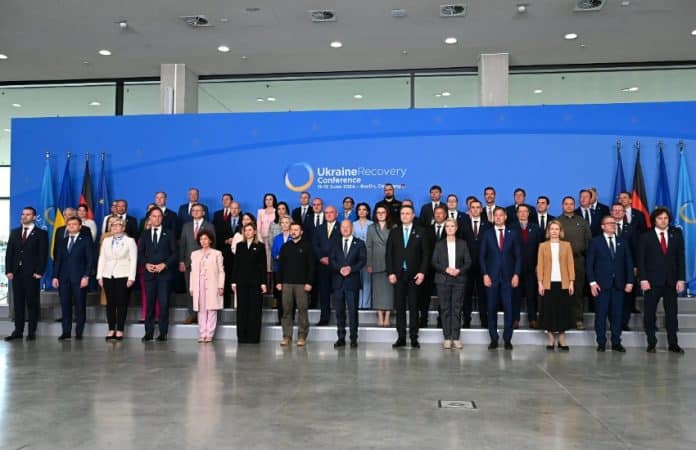Germany and Ukraine are co-hosting this year’s Ukraine Recovery Conference on 11 and 12 June. More than 2000 participants from more than 60 countries are meeting in Berlin to discuss how to further support Ukraine as the country rebuilds.
According to the German hosts, the Federal Foreign Office and the Ministry for Economic Cooperation and Development, the conference aims to send a new signal of solidarity with Kyiv at the start of a week of intense diplomacy.
The two-day Ukraine Recovery Conference in Berlin follows a similar gathering in London a year ago. It comes before the G7 summit of Ukraine’s leading Western allies in Italy and a global peace summit in Switzerland this coming weekend.
United Nations Development Programme (UNDP) Administrator Achim Steiner, attending on behalf of the United Nations, emphasized in the run-up to the conference that “it is important to give the Ukrainians the feeling that there is a tomorrow”. “As war is still raging in Ukraine, the conference in Berlin will focus strongly on short-term measures”, Steiner said.

The Berlin meeting will again confirm that Ukraine is receiving enormous international support, he underlined. However, the conference also aims to sensitize the international community to the immediate actions that can be taken for reconstruction. “It is about a perspective for the future”, according to the UNDP Administrator.
When asked about the role of the United Nations in Ukraine’s reconstruction process, Steiner described the challenge of translating vision and aspirations into practical and operational realities. He emphasized that the UN has been a deeply invested partner to Ukraine, firmly committed to its future. “As we speak today, 3.000 UN staff across 24 different agencies and programmes are working in Ukraine: they are supporting the humanitarian response, early recovery and reconstruction work, and they are engaged in long-term and systemic reforms”, he stated.
Steiner underlined that the United Nations is focused on the priorities the Ukrainian government has set for itself. The UN’s support ranges from caring for refugees and internally displaced people and helping them regain their livelihoods to removing rubble, clearing unexploded ordnance, and handling demining. Additionally, the UN is working on energy infrastructure to reconnect people to electricity.
“Many of our UN agencies in the UN country team are also working with local ministries, local government and local business leaders – whether it is helping bring children back to school by being able to repair schools, by operating health centres, by reconnecting citizens to social welfare and social safety nets”, he explains. “The bottom line for our engagement is to both respond to the humanitarian crises but also to invest and be very proactive in helping Ukraine to function as a state at national, at local level in order to have an economy to continue to sustain the Ukrainians”.
In closing, Steiner expressed his hope that the broad spectrum of UN engagement – for Ukrainian citizens, the restarting of businesses, and the restoration of basic infrastructure – will enable Ukraine “to sustain its people with hope and dignity in the future. This remains our commitment”, he affirmed.
For more information about the UN’s work in Ukraine visit:
To follow the Ukraine Recovery Conference live visit:




